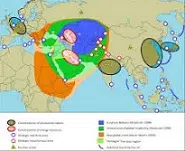In order to discover the meaning of the term geopolitics, it is necessary that, first of all, we know its etymological origin. In this case, we can state that it is a neologism that comes from the sum of two Greek words:
-Geo, which can be translated as “earth”.
-Politikos, which is the result of the union of several lexical components of said language: the word “politeia”, which is equivalent to “citizen quality”, and the suffix “-ia”, which is used to indicate “quality”.
Likewise, it is necessary to know that this neologism was created by the Swedish professor, politician and geographer Rudolf Kjellén (1864 – 1922). Specifically, it was officially presented in 1899.
The notion of geopolitics can be used in various ways. As a field of study, it alludes to the conditions that geography imposes on politics . The concept can also be used as an adjective to refer to what is linked to a geographical and political perspective of an area.
 For example: “I believe that geopolitics will influence the next presidential elections” , “Specialists maintain that this year's agenda will be marked by geopolitical problems” , “I need an expert in geopolitics to write an article for our newspaper” .
For example: “I believe that geopolitics will influence the next presidential elections” , “Specialists maintain that this year's agenda will be marked by geopolitical problems” , “I need an expert in geopolitics to write an article for our newspaper” .
It can be said that geopolitics analyzes the effects caused by physical geography and human geography on foreign relations and international politics . Thus, it contributes to understanding how politics develops based on the geographical characteristics of a region.
According to geopolitics, political events and their consequences maintain a close link with the space in which they occur. Political power, in fact, is directly linked to physical space, which determines the scope of its powers.
The Germans Friedrich Ratzel (1844-1904) and Karl Ernst Haushofer (1869-1946), the American Alfred Mahan (1840-1914) and the Englishman Halford John Mackinder (1861-1947) also made important contributions to the initial development of geopolitics. .
In the same way, we can indicate that the aforementioned geopolitics is based on four bases, arguments or pillars:
-The most important thing for a country is to maintain its territorial unity.
-All countries aim to maintain an optimal level of power in order, among other things, to have a certain capacity to influence others. To achieve this goal they can adopt actions such as carrying out a war, letting others deal with problems, balancing the aforementioned power...
-The countries, due to the desire to maintain the aforementioned territorial unity, are going to take measures to defend their borders.
-All countries require and need to carry out connections with other countries that are maintained over time and that, in addition, offer them reliability.
It is important to mention that, beyond the state level, geopolitics also has relevance for multinational companies . These companies establish territorial strategies taking into account the political situation and its effects on the markets .
